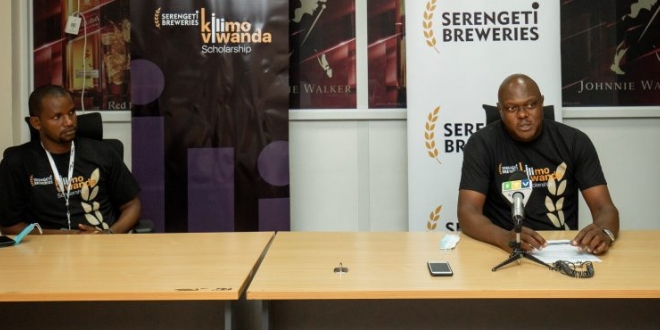AfricaPress-Tanzania: THE country is endowed with enormous natural resources, which are critical in economic growth. Arable land being one of them is vital the growth as data shows the country has over 44 million hectares. Moreover, the agricultural sector substantially contributes to Tanzania’s foreign exchange-
-earnings, with more earnings from cash crop exports but also provides many endless opportunities through internal and external markets.
In addition, agriculture remains the largest sector that provide livelihoods and employment for many of the country’s poorest households based in rural areas. The sector is still dependent on rainfall, limited use of quality seeds, inadequate fertilizers, unreliable markets and few agricultural experts.
It is under this context that Serengeti Breweries Limited deliberately introduced ‘Kilimo-Viwanda’ scholarship program to compliment government’s effort to improve the agricultural sector, critical to the realization of the ambitious 2021/22 to 2025/26 National Development Plan.
SBL’s viable involvement in agriculture is linked to its network of over 400 farmers in eight regions across the country. Through the farmers, SBL gets commodities such as maize, sorghum and barley for use as raw materials in beer production. In return, the company provides the farmers with free seeds, field technical services and links them to financial institutions to access credit.
The ‘Kilimo-Viwanda’ program started in 2019 and has since strengthened the agriculture value chain by enhancing that youth with agri-business backgrounds in areas where SBL’s network of farmers reside, get knowledge and expertise to help transform them from subsistence to commercial farming.
This scholarship program targets children from underprivileged families whose families cannot afford to pay their college fees. Through the scholarship, they have an opportunity to become self-reliant and successful entrepreneurs through knowledge and skills acquired at the colleges.
Currently in its second year, the program has helped 70 students study agricultural-related courses in at technical agro-training colleges. Just recently, SBL announced an additional 15 beneficiaries of the scholarship based at Kaole Wazazi Agricultural College in Bagamoyo.
Speaking at the event, SBL’s Managing Director, Mark Ocitti affirmed the brewer’s commitment to support the resilient agrarian revolution set by the government. Ocitti said, “Tthe program compliments government’s effort to strengthen the existing pool of agricultural experts, needed by the country to support transformation of the agriculture – a sector on which the majority of Tanzanians depend on for livelihoods.”
Like other programs, ‘Kilimo-Viwanda’ helps reduce unemployment amongst youths by equipping them with skills and knowledge which transforms their mindsets to practice agri-business through modern farming.
Farmers across the country are often at ease when acquiring management skills like land preparation, planting, weed, pest and disease control. Such activities will also be available to young farmers who are trained at the four colleges working with SBL.
The four colleges also include; Saint Maria Goretti College of Agriculture, Igabiro College of Agriculture and Kilacha Agricultural College. Speaking at the unveiling of the 15 new students at Kaole college, Vice Principal, Maxmillian Sarakikya applauded SBL’s valuable contribution to the community through training of the students to expand their expertise in the field of agri-business. Sarakikya requested other stakeholders to emulate SBL’s example and join the cause as it helps fight against poverty.
The good news is that with a growing market, SBL is optimistic to increase its beer production hence fueling more demand for raw materials supplied by farmers and will reach 85 percent by 2025. “It gives impetus for local farmers in seeking more agri-business knowledge to increase their supply of raw materials,” said the SBL Managing Director. Currently, SBL sources 17,000 metric tons of grains locally, equivalent to 70 percent of its annual total raw materials requirement.



